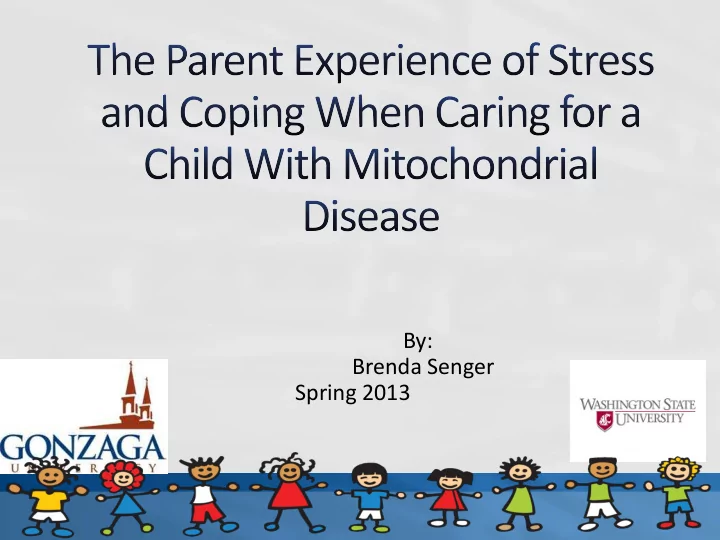

By: Brenda Senger Spring 2013
RN 28 years Nurse Educator Mother of 4 children May 23, 2003 4 y/o daughter Probable Mitochondrial Disease
PhD program Goal: identify stress and coping in parents of children with Mito Educate health care professionals Provide support to parents of children with Mito Take this survey https://wsunursing.qualtrics.com/SE/?SID=SV_cOnqRUyfTTHO5a5
Describe what is known about stress and coping when caring for a child with chronic illness Describe what is known about the needs of parents caring for a child with Mito Discuss the importance of identifying the specific needs of stress and coping for parents of children with Mito
Increased prevalence Larger population of children with special needs Medical assistance is helping these children grow into adulthood with increased functioning and better quality of life
Complex Unpredictable trajectory Neurodegenerative disease can deteriorate either within a short period of time or over many years. Challenges can be overwhelming: Physical, emotional, financial, social, spiritual Anxiety, stress, and uncertainty
Chronic Illness is a stressor for parents and children Relationship between parent stress and child distress The higher the parental stress the greater the level of distress in the child Parental maladjustment depends on length of illness, functional impairment, severity of illness
Parents of children with multiple and severe chronic illness have more unmet needs than children with a single chronic illness Unmet needs are proportionate to the severity and complexity of the child’s illness. Mito is complex affecting many body systems
Medical care Financial burdens Finding a skilled provider Insurance coverage Fragmentation of care Activities of Daily Living Getting referrals Coordinating with schools and other organizations Travel for medical appointments Organizing home health care
Visible Demands Invisible Demands Medical care Worry Treatments Fear Monitoring symptoms Uncertainty Physical demands Future for their child Activities of daily living Public reaction to disability Developmental delay Tolerance Impaired social skills Stigmatization School needs
Normalcy Certainty Information Control over stressors Partnerships with health care providers
It is stressful to care for a child with a chronic illness It is a family affair It is cross-cultural Successful management of illness is dependent on ability of parent to cope Coping is influenced by ability to resolve uncertainty in illness
Successful management of the child's illness depends on the ability of parent to cope Disease rareness, age of onset, loss of function, impact on mobility, course of illness, cognitive function, ability to communicate, visibility of illness Emotional support and positive coping influenced psychosocial adjustment of parents
Rare Childhood Disease Inherited Chronic neurodegenerative Life Limiting No cure No biological marker No Treatment Variety of clinical symptoms
Not a single chronic disease Spectrum of inherited disorders Unknown disease trajectory Unknown prognosis Neurodegenerative disease may look well at diagnosis, but deteriorate slowly or within a short period of time.
Uncertainty of diagnosis, prognosis or disease progression in a complex health care setting Physically, emotionally, financially, socially and spiritually Expansion of Parent role Medical experts Care coordinators Advocates Teachers
Medical care Office visits Hospitalizations Special medical equipment at home/school Wheelchairs, developmental delays, g-tubes, vision problems Physical care of the child Coordinating care with social services and the educational system
Worry Fear Uncertainty of illness trajectory Variability of symptoms Diagnosis or not? Public reaction to child’s disability Health care providers understanding needs Developmental lags of the child
Medical Science is taking lead role First documented case in 1962 Diagnosis is difficult No biological marker Muscle biopsy Genetic sequencing Definite, Probable, Possible or Unlikely Treatment depends on symptoms Mito cocktail
Gap in the number of studies done to understand needs of Mito parents Parents want information about: symptoms, prognosis, life expectancy, genetics, coping, and support. Health professionals lack information to give to parents
Usually primary care giver Mothers experience greater psychological strain Mothers of children with Mito and PKU Need of more health care services More specialists More hospitalizations More financial burden Out pocket expenses Number of work days missed More stress, strain and worry,
Personality profiles of Mito mothers Elevates scores in Hypochondria, Hysteria Paranoia Depression Anxiety Related to stress of uncertainty, and caregiving demands
Study from Korea Compare moms of children with epilepsy & Mito Higher caregiver burden Lower quality of life Greater depression and anxiety Guilt with maternal inheritance
Caring for a child with Mito is stressful Parents want information about diagnosis, treatment, progression and genetic transmission Control over child's health care Support from family and friends predict quality of life Reliance on health care providers
Risk for emotional distress and family dysfunction Uncertainty associated with Mito Stress with uncertainty More research needed Parents want information, coaching, validation and competent health care providers
Please take and complete this survey and contribute to the growing body of knowledge around the needs of parents caring for a child with Mitochondrial disease. Mitochondrial Disease Parent Survey https://wsunursing.qualtrics.com/SE/?SID=SV_cOnqRUyfTTHO5a5
Brenda Senger RN, MA, PhD(c) Brenda.senger4@gmail.com
Recommend
More recommend